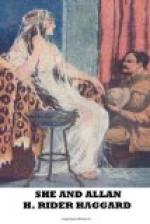Passing over certain high, misty lands during the third week of our trek, where frequently at this season of the year the sun never showed itself before ten o’clock and disappeared at three or four in the afternoon, and where twice we were held up for two whole days by dense fog, we came across a queer nomadic people who seemed to live in movable grass huts and to keep great herds of goats and long-tailed sheep.
These folk ran away from us at first, but when they found that we did them no harm, became friendly and brought us offerings of milk, also of a kind of slug or caterpillar which they seemed to eat. Hans, who was a great master of different native dialects, discovered a tongue, or a mixture of tongues, in which he could make himself understood to some of them.
They told him that in their day they had never seen a white man, although their fathers’ fathers (an expression by which they meant their remote ancestors) had known many of them. They added, however, that if we went on steadily towards the north for another seven days’ journey, we should come to a place where a white man lived, one, they had heard, who had a long beard and killed animals with guns, as we did.
Encouraged by this intelligence we pushed forward, now travelling down hill out of the mists into a more genial country. Indeed, the veld here was beautiful, high, rolling plains like those of the East African plateau, covered with a deep and fertile chocolate-coloured soil, as we could see where the rains had washed out dongas. The climate, too, seemed to be cool and very healthful. Altogether it was a pity to see such lands lying idle and tenanted only by countless herds of game, for there were not any native inhabitants, or at least we met none.
On we trekked, our road still sloping slightly down hill, till at length we saw far away a vast sea of bush-veld which, as I guessed correctly, must fringe the great Zambesi River. Moreover we, or rather Hans, whose eyes were those of a hawk, saw something else, namely buildings of a more or less civilised kind, which stood among trees by the side of a stream several miles on this side of the great belt of bush.
“Look, Baas,” said Hans, “those wanderers did not lie; there is the house of the white man. I wonder if he drinks anything stronger than water,” he added with a sigh and a kind of reminiscent contraction of his yellow throat.
As it happened, he did.
CHAPTER V
INEZ
We had sighted the house from far away shortly after sunrise and by midday we were there. As we approached I saw that it stood almost immediately beneath two great baobab trees, babyan trees we call them in South Africa, perhaps because monkeys eat their fruit. It was a thatched house with whitewashed walls and a stoep or veranda round it, apparently of the ordinary Dutch type. Moreover, beyond it, at a little distance were other houses or rather shanties with waggon sheds, etc., and beyond and mixed up with these a number of native huts. Further on were considerable fields green with springing corn; also we saw herds of cattle grazing on the slopes. Evidently our white man was rich.




